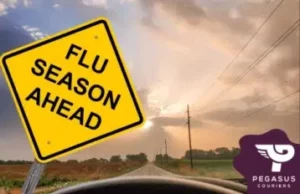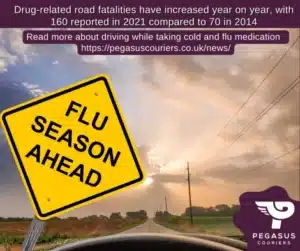Cold and Flu Medicine and UK Driving Laws
Phil West

Are you aware of the potential risks of driving while taking certain medications?
It may surprise you to learn that everyday medications like painkillers and allergy remedies can impair your ability to drive safely. In this article, I will discuss the dangers associated with driving under the influence of specific medications and the legal consequences that can result from drug-driving offences. It is important to stay informed and make responsible choices when it comes to driving with prescription drugs. Your safety, as well as the safety of others on the road, depends on it.
Cold and Flu Medicine: Beware of Drug Driving
Did you know that taking over-the-counter cold and flu medication can impair your ability to drive? It’s important to be aware that drug driving is against the law and can have serious consequences for your job and driving privileges. So, can you still get behind the wheel after taking flu and cold tablets? Here, we explore the effects of medication on driving and provide valuable information about which prescription drugs you should avoid when driving in the UK. By staying informed, you can ensure your safety on the roads.
Over-the-counter cold and flu medicine and drug driving laws
When you take over-the-counter cold medicine, it’s important to be aware of how it can affect your ability to drive. Many people don’t realise that certain medications used to treat cold and flu symptoms are included in drug driving laws. It’s illegal to drive if you have certain levels of illegal drugs in your system or if you’re unfit to drive due to legal drugs. These over-the-counter medications can impair your driving by causing drowsiness, dizziness, blurred vision, and slower reaction times. To ensure your safety and the safety of others on the road, it’s crucial to read medication labels and understand the potential side effects before getting behind the wheel. By prioritising your health and making responsible choices, you can avoid the serious consequences of impaired driving.
Facts About Driving & Flu Medication:
- Drug driving is a factor in 1 in 20 fatal crashes.
- A 2021 government report states that the number of deceased drivers with at least one trace of impairment drug is higher than those with any amount of alcohol.
- The number of deceased drivers with ‘impairment drugs’ present has increased by over 60% from 2014 to 2021, while those where alcohol has been detected have barely changed.
- Drug related road fatalities have increased year on year, with 160 reported in 2021 compared to 70 in 201 4
What prescription drugs can you not drive on in the UK?
Certain prescription drugs can impair your ability to drive safely in the UK. It’s crucial to consult your doctor or healthcare professional for guidance on driving while taking specific medications. One example of such a drug is diazepam, which is a sedative and muscle relaxant. It can cause drowsiness, dizziness, and blurred vision, all of which can affect your driving skills. Additionally, antihistamines, commonly used for allergies, as well as dextromethorphan and phenylephrine found in some cough and cold remedies, should be used with caution while driving. Always make sure to read the labels and warnings of your medications and follow the advice of your healthcare provider to ensure safe driving.
Can a drug driving offence ruin my career?
Having a driving conviction can greatly impact your employment prospects, especially if your job requires a clean driving record. Many employers, particularly those in positions involving vulnerable individuals or government roles, require the disclosure of any unspent convictions. While some companies may be willing to give individuals a second chance, it can be challenging to disclose a conviction. Additionally, the cost of car insurance for convicted drivers can affect your finances. A driving conviction can limit future career opportunities, especially in driving-related jobs, due to the associated stigma. To overcome the impact of a driving conviction during job applications, it is important to be transparent about your driving history, demonstrate personal growth and reform, and emphasise your skills and experience.

Can you drive after taking flu and cold tablets?
Before getting behind the wheel, it’s important to consider the potential effects of taking flu and cold remedies. If you have flu symptoms, first research which medication can have a negative impact on your ability to drive. While medications can provide relief from symptoms, they may also have side effects that can impair your ability to drive safely. To ensure your safety, always read the labels and follow the instructions carefully before taking any medication. If you’re unsure about how a specific medication may affect your driving, it’s best to consult with your healthcare provider or pharmacist. It’s better to prioritise safety and consider alternative transportation if you’re feeling unwell.
The effects of drugs on driving
Whether it’s over-the-counter medication or illegal substances, any drug that affects your cognitive and physical functions can pose a risk on the road. Cold and flu medications often contain ingredients like antihistamines or decongestants, which can cause drowsiness. These effects can slow down your reaction time, impact your coordination, and make it difficult to focus on the road. Drugs can make it hard to respond quickly to hazards or unexpected situations. These effects can lead to accidents, injuries, and even fatalities. It’s important to note that drug driving convictions can result in severe legal consequences, such as unlimited fines, driving licence disqualification, and imprisonment.
Medicines that could get you fined or banned from driving
Using common medications while driving can result in fines or even a driving ban. It’s important to be aware that certain over-the-counter medicines can impair your ability to drive safely. Medications that are commonly used to relieve symptoms like cough and congestion can have side effects that affect your concentration, reaction times, and vision. To avoid potential legal consequences, it’s crucial to read the labels and warnings on medication packaging carefully. If you’re unsure about how a specific medication may affect your driving, consult your healthcare provider for guidance. Remember, the law in the UK prohibits driving while impaired by drugs, including over-the-counter medications. Prioritise your safety and the safety of others on the road by being well-informed and responsible when it comes to taking medication and driving.
How do the police enforce the medicated driving law?
Enforcing the drug-driving involves conducting field impairment assessments and using drug testing kits. When the police have reason to suspect that a driver is under the influence of drugs, they have the authority to stop road users and administer either a roadside screening test or a field impairment test. These tests can also be conducted if the driver has committed a traffic offence or been involved in a road traffic collision.
During a roadside stop, police officers can test for drugs like cannabis and cocaine. However, for drugs such as ecstasy, LSD, ketamine, and heroin, the screening is done at a police station. It’s important to note that even if a driver passes the roadside check, they can still be arrested if the police believe drugs impair their driving. In such cases, the driver may be taken to a police station for further tests to determine the level of impairment.
Understanding the methods used by the police to enforce the drug-driving law is essential, as the consequences of driving under the influence of drugs can be severe. It is crucial to prioritise road safety and avoid putting oneself and others at risk by driving while impaired.
Inform the DVLA: Why take the risk?
Failing to inform the DVLA about a medical condition and a prescription that can affect your driving can result in fines of up to £1,000. It’s important to be aware of how prescription drugs can impact your ability to drive safely. Some medications, like painkillers containing codeine, can cause drowsiness, while others, such as Migraleve and Syndol, can lead to dizziness. Certain prescription drugs may even cause changes in hearing, which can be confusing while driving. Antihistamines found in allergy medications can also cause drowsiness and reduced alertness. Additionally, antidepressants and antipsychotics can affect concentration and reaction times. Informing the DVLA not only helps you avoid penalties but also ensures road safety for everyone.
Driving while medicated - It Could Change Your Life.
As the flu and cold season approaches – please remember to drive safely! It is important to be aware of the potential dangers of driving while under the influence of certain medications, even homemade flu remedies. Yes – you could be breaking the law if you are taking certain painkillers, antihistamines, and certain antidepressants while driving.
Drivers must make responsible choices and prioritise road safety – it is not only your life at risk on the road! Be smart and ask your doctor or healthcare provider for advice!
At Pegasus Couriers, we take road safety very seriously and often brief drivers on the rules of the roads and various internal policies.
Hopefully, this information will help save someone from some hefty consequences!
Drug driving and Impact on Insurance
The impact of drug driving on your insurance coverage can be significant. If you are found guilty of drug driving, your insurance premiums are likely to increase. This could mean you will need to find an insurance provider that will assist you. Usually, this means an increase in premiums – in some cases, double or triple the normal amount.
This is because drug driving is considered a serious offence that poses a risk to road safety. Insurance providers view drug driving convictions as an indication of risky behaviour and are, therefore, more likely to charge higher premiums. It is important to note that using flu medicine this autumn, whether prescribed or over-the-counter, can affect your ability to drive. It is always recommended to consult with a healthcare professional about the potential side effects of any medication before getting behind the wheel. Remember, staying within the legal limit and prioritising road safety is crucial for both your insurance coverage and the well-being of yourself and others.
The penalties for drug driving in the UK
If you’re caught driving under the influence of drugs in the UK, you could face serious consequences. Convicted drug drivers may receive a minimum one-year driving ban and a criminal record. The penalties don’t end there – you could also be fined without limit and up to 6 months in prison. Endorsements on your driving licence can last for 11 years afterwards, making it challenging to find employment and potentially increasing your car insurance costs. In the most severe cases, causing death by driving dangerously while under the influence of drugs can result in life imprisonment. It’s important to remember that driving while impaired by drugs is illegal, and the police can conduct drug testing. The penalties for drug driving are significant, so it’s crucial to prioritise your health and the safety of others on the road.
Cold and Flu Medication: Driving Frequently Asked Questions
What Are Some Common Over-the-counter Cold and Flu Medications That Can Impair Driving?
Using certain over-the-counter cold and flu medications can affect your ability to drive safely. It’s crucial to understand the potential side effects before operating a vehicle. These medications can impair your concentration, reaction time, and judgment, putting you and others at risk on the road. To ensure your safety, it’s important to read the labels of these medications carefully and follow the recommended dosage. If you experience any drowsiness or dizziness while taking these medications, it is advised to refrain from driving until the effects wear off. Always prioritise your well-being and the well-being of others when it comes to driving and medication use.
How Long Should I Wait After Taking Flu and Cold Tablets Before Driving?
After taking flu and cold tablets, it is important to wait for a few hours before driving. These medications can cause drowsiness or slow down your reaction time, which can compromise your safety on the road. Give yourself enough time to recover and ensure that you are fully alert before getting behind the wheel. Remember, your well-being and the safety of others are paramount.
Are There Any Specific Prescription Drugs That Are Known to Impair Driving in the UK?
It’s crucial to understand the potential impact of your medication and ask for advice on how to take your medication from the doctor or pharmacist. Being aware of how your prescription drugs can affect your driving is essential for road safety.
Can Everyday Medicines, Such as Painkillers or Antihistamines, Result in Fines or Driving Bans?
Yes, taking common medications like painkillers or antihistamines before getting behind the wheel can lead to fines or even a driving ban. It’s important to understand the potential impact these medicines can have on your ability to drive safely.
How Do the Police Determine if a Driver Is Under the Influence of Drugs While Driving?
Determining if a driver is under the influence of drugs is a process that involves several methods employed by the police. These methods include observing the driver’s behaviour, conducting roadside tests, and analysing samples of blood or urine. By carefully observing the driver’s actions and conducting tests, law enforcement officers can gather evidence to determine whether or not drugs are impairing the individual’s ability to operate a vehicle safely. The analysis of blood or urine samples provides scientific evidence that can support the case against a drug-impaired driver. This process is crucial for ensuring the safety of all individuals on the road and holding accountable those who choose to drive under the influence of drugs.
bike couriers and deliveries
Courier Bikes The Future of Parcel Delivery? Learn how they reduce congestion, pollution, and costs, and why they’re quickly becoming the preferred choice for enterprises and cities alike. Here we discuss teething problems and how electric cargo bikes can transform urban transportation. The Rise of Cargo Bikes in Urban Delivery Cargo bikes, especially those ...
More Here →
builders turn courier drivers
Builders Turn Delivery Drivers Are you a builder feeling the effects of the current economic hardships? Well, we’ve got some good news for you! We understand how tough it is right now, and we want to lend a helping hand. Here, I will explain how builders can trade tool belts for the wheels of opportunity. ...
More Here →
driver shortage
Shortage of Drivers a Real Issue The industry faces a significant challenge, from the shortage of skilled courier drivers to retention and recruitment issues. As consumers become more accustomed to doorstep deliveries, businesses are under immense pressure to meet expectations. Here Pegasus Director Martin Smith discusses challenges facing delivery driver recruitment and retention. Courier ...
More Here →
